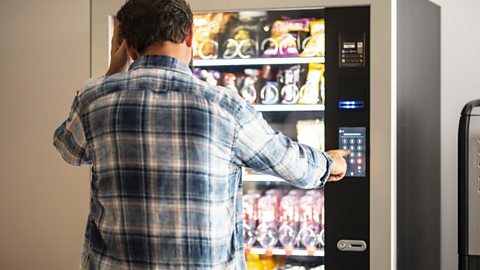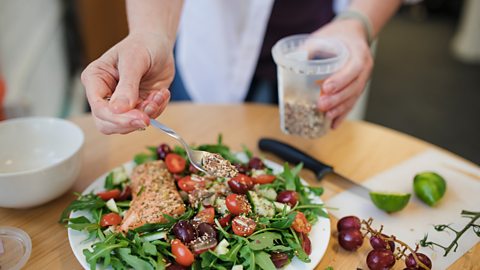Is your job ruining your diet?
Whether you’re on your feet all day, work shifts or have a high-pressured role, there are many reasons why your job could be impacting your diet…

As many office workers head back to the workplace after two years of working from home, albeit often on a hybrid basis, the old lunchtime habits return: pre-packed sandwiches, eaten at a desk, with convenience snacks and fizzy drinks to mark out the day. Sales at chain cafes are increasing, while sales within the grocery market (both home deliveries and in-store) are said to be decreasing back towards pre-pandemic levels.
Cake Thursday may not be doing you too much harm, but for some workers, the job has a more detrimental effect on their diet and overall health.
Stress
Amy Tolofari is a Registered Public Health nutritionist and a lecturer in Public Health Nutrition at Coventry University. She explains that working in a high-pressured environment may impact your diet. “We know there’s a huge link between mood and food in terms of the choices that you make,” says Tolofari.
“We know that stress can lead to high levels of cortisol in our body, which, over a long period of time, can lead to chronic levels of stress and heightened cravings because you have a lowered or impaired glucose tolerance. It can impact your appetite as well.”
If stress is causing you to feel irritable or anxious at work, trying to lift your mood with high-sugar foods or drinks may be kicking off a vicious cycle. After an initial spike in blood sugar, there is inevitably a drop, leading to tiredness and irritability. Inconsistent blood-sugar levels have even been linked to mood disorders including depression and anxiety. Low mood or anxiety may put you in a worse position to manage the stress of your job and the cycle continues.
Related stories
Workplace culture
As part of a study, Dr Kirsty Pourshahidi, a lecturer in food science and technology at Ulster University, spoke to people working in the accommodation and food services industry about their experiences of eating during working hours. One hotel chef she interviewed explained that they had tried to encourage healthy eating for night shift workers by preparing soup and sandwiches for them. “They ended up throwing it out because the workers mostly went out and got takeaway.”
“If one person says, ‘I’m going out to get pizza’, then people join in,” Pourshahidi adds. This is more common if your place of work is situated in a town or city where there are lots of local options or if facilities on-site include vending machines.
Reliance on takeaway meals or ultra-processed foods can have an impact on physical and mental health. An experiment run by Liverpool John Moores University showed that consuming two takeaways daily resulted in weight gain and increased cardiovascular disease risk, in over half the participants, with some saying they felt sleepless, sluggish and unmotivated after two weeks. The good news for the participants is that they were unlikely to experience long-term health issues if they reverted to their usual diet.
Having on-site healthy eating facilities can improve the diet of workers but only if they are used.
Poor break times

If your job is constantly busy, you may not be taking regular breaks. People may feel they can not take even a short break because of workload, or because breaks are unpaid or because breaks may be discouraged by monitoring systems. “The workplace should provide a culture that values the importance of a break, and give people the opportunity to sit down,” says Tolofari.
Irregular mealtimes, fit in around shifts or irregular breaks, can cause the same fluctuations in blood sugar as above, but eating at odd hours can also impact your ability to get a good night's sleep compounding the fatigue caused by working long hours without a breaks.
Worryingly, Pourshahidi discovered that the issue had another knock-on effect. When interviewing people working in health and social care, she says: “Keeping hydrated was a big issue… They described sometimes being too busy to take bathroom breaks. So that discouraged them from drinking water because then they would have to go to the bathroom more frequently.” Even mild dehydration can cause fatigue and impaired memory, cognitive performance and decision-making ability.
Night shift and rotational shift workers have it hardest

Dr Pourshahidi has worked on several studies examining the diet of shift workers (people who work outside the traditional daytime hours). In one 2020 study she found that ‘shift workers are reported as more likely to gain weight than day workers… In particular, individuals who have been exposed to shift work for more than five years…’
Tolofari explains: “There are a lot of stats suggesting shift workers report a less nutritionally dense diet, with lower intake of fruit and vegetables, and higher intake of foods that contain sugar and saturated fat.” Both Tolofari and Pourshahidi highlight that for those who work anti-social hours, eating healthily can be tricky logistically. Staff canteens (if they exist) may be closed at night, as are food shops apart from convenience stores and takeaways.
It’s not just the quality of the food, it’s the way our bodies process it. Our circadian rhythm is our body’s biological clock that tells us when it's time to sleep, wake and subsequently when we should eat and be active. Its something Yan Yin Phoi, a dietitian and PhD student at the University of South Australia has studied as part of an investigation into dietary interventions for night shift workers.
“Insulin sensitivity and glucose tolerance follows our circadian rhythm and is poorer at night,” explains Phoi, “Human studies have shown that that having meals earlier rather than later in the day, or even distributing a greater proportion of energy intake towards earlier parts of the day, is beneficial for cardiometabolic health outcomes.”
Phoi points out that more research is required before a health policy for shift workers is produced (something she is working on), but she does explain: “It may be beneficial for night shift workers to consider having their main meal earlier rather than later in the night, and to choose smaller, lower calorie snacks that are higher in fibre when they get hungry in the middle of the night.”
How to stay healthy regardless of where you work
Plan ahead
All the experts agree that meal planning is key, especially if you’re working antisocial hours where you won’t have much choice. Phoi explains: “Night shift workers should take every opportunity to consume items from food groups that are essential for health that are often missed, such as fruits, vegetables, wholegrains, and dairy products.
Anyone who struggles to get wholesome food during work should pack: “whole fruits, dried fruits, vegetable sticks, wholegrain crackers with cheese, small tubs of yoghurt, or milk. These are simple snacks that ensure satiety, while being lower in calories and providing essential vitamins and minerals to the body."
Jasmine Carbon, a community dietitian at Guy's and St Thomas' Hospital, suggests packing a good protein source as well: “Quorn mince, lentils, and low-fat minced meat are good protein sources which take no time at all to cook. Bagged salads, fruit pots, boiled egg pots, are really good grab-and-go foods if you're in a rush.”
Eat mindfully
Tolofari says: “There's lots of research emerging showing the importance of mindful eating. Slowing down your meals aids digestion and makes you mindful of your hunger and fullness cues.” She suggests people should “make a conscious effort to sit down at a table and try to remove any distractions,” so no lunch al desko.
Think about what you need to fuel you
Tolofari says, “Everybody is unique. And we all need different levels of nutrients. So, there isn't a diet that’s aimed at different types of workers… If you're sat at a desk all day, you won't be burning off as many calories… You could prioritise higher proteins such as a Greek yoghurt, for example, and pair that perhaps with fruit.”
“Eating a very large meal especially before starting the night shift might make the person feel sleepy,” says Carbon, “so it's better to have smaller and more balanced meals with a high protein, low-carbohydrate snack in the middle of the shift.”
Time your meals to aid your work
Pourshahidi points out it’s best to eat as regularly as possible, and earlier in the day and not late at night. However if that’s not possible, Carbon says “change to a pattern that suits and agrees with you the most.”
Whatever type of work you do, Tolofari says: “Make sure you prioritise sleep and avoiding having food at least two hours before your bedtime, to allow enough time to digest the food and aid a good quality sleep. Caffeine has a half-life of six or seven hours, so it's very important to try and cut that down well before your planned bedtime, avoid alcohol and try to stay hydrated throughout your shift to help with fatigue and also concentration.”
Originally published April 2022



